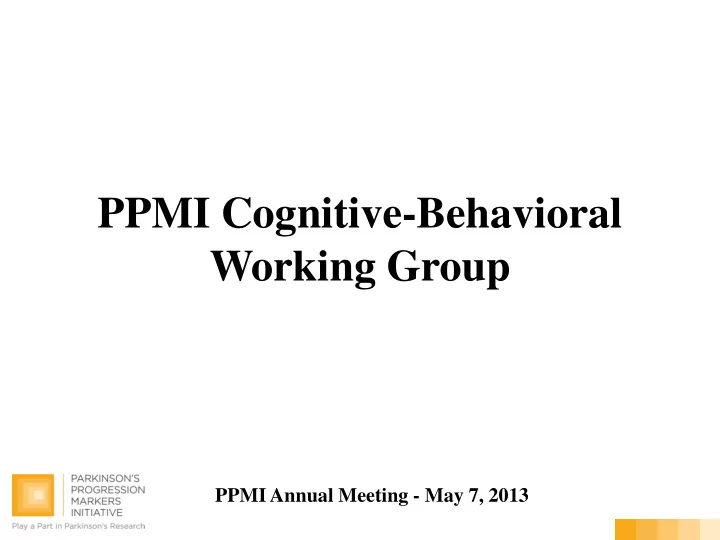

PPMI Cognitive-Behavioral Working Group PPMI Annual Meeting - May 7, 2013
Membership Daniel Weintraub – WG Chair Tanya Simuni – Steering Committee Shirley Lasch – IND Chris Coffey, Eric Foster – Statistics Core *Andrew Siderowf Matt Troyer Alastair Reith Michael Ward Bernard Ravina Paolo Barone Chris Dodds Regan Fong Jamie Eberling Doug Galasko David Burn Sandeep Gupta David Hewitt Susanne Ostrowitzki Irene Richard Thomas Comery Jim Leverenz Tony Wei-hsiu Ho Keith Hawkins William Cho Johanna Devoto John Sims Melanie Brandabur Michelle York
Organization • Study assessments and outcome measures • Preliminary results • Analysis and publication plan
Study Assessments and Outcome Measures
PPMI Behavioral Assessments • Geriatric Depression Scale (GDS-15) • State-Trait Anxiety (STAI) • Impulse control disorder (ICD) symptoms (QUIP) • Olfaction (UPSIT) • Daytime sleepiness (ESS) • RBD (REM Sleep Disorder Questionnaire) • Autonomic symptoms (SCOPA-AUT)
PPMI Cognitive Assessments • Global - Montreal Cognitive Assessment (MoCA) • Memory - Hopkins Verbal Learning Test (HVLT) • Visuospatial - Benton Judgment of Line Orientation (JOLO) • Working memory - Letter-Number Sequencing (LNS) • Executive - Semantic fluency (animals, fruits, vegetables) • Attention - Symbol-Digit Modalities Test (SDMT)
Addition of Cognitive Diagnosis • Initially unable to diagnose mild cognitive impairment (MCI) or dementia in PPMI • These diagnoses of clinical relevance in PD – Categorization more clinically meaningful than change in cognitive test score • MDS recommended criteria for both PD dementia (2007) and MCI (2012) now exist
MDS Criteria for MCI and Dementia MCI (Level 1) Dementia • Report of cognitive decline • Report of cognitive decline from premorbid status from premorbid status • Impaired cognitive • Impaired cognitive performance performance – At least 2 test scores 1-2 SD – Impairment in at least 2 below the standardized mean cognitive domains – Single or multiple domains • Significant functional • No significant functional impairment resulting from impairment resulting from cognitive decline cognitive decline
Steps for Determining Annual Cognitive Diagnosis in PPMI 1. Investigator determines presence of cognitive decline from pre-PD state based on clinical interview and knowledge of patient 2. Investigator determines presence of significant functional impairment due to cognitive deficits interfering with routine instrumental activities of daily living (IADLs) 3. Subject has neuropsychological testing at study visit 4. Categorization of normal cognition, MCI, or dementia made centrally based on steps #1, #2 and #3
CRF for Cognitive Decline and Functional Impairment
Impairment on Cognitive Testing 4 domains and 6 test scores: Memory (HVLT (# words and recognition discrimination)) Visuospatial (JOLO (correct responses)) Working Memory-Executive (LNS (correct responses) and semantic fluency (# words)) Attention-Processing Speed (SDMT (correct responses)) MCI – At least 2 test scores >1.0 SD (16 th %ile) below the standardized mean, regardless domain(s) Dementia – At least 1 test score from any 2 domains >1.5 SD (7 th %ile) below the standardized mean
Assigning Cognitive Diagnosis
Preliminary Results
Neurology 2013;80:176-180.
Preliminary Baseline Results - MoCA PD HC SWEDD p value
MoCA Cut-off Scores in PD Consistent with research reporting 15-20% of de novo PD patients have MCI.
Preliminary Baseline Results – Neuropsychological Battery
Preliminary Baseline Results – GDS PD HC SWEDD p value Ravina et al. Neurology 2007;69:342-347.
Preliminary Baseline Results – STAI* PD HC SWEDD p value *Results represent combined trait and state anxiety scores (score range 40-160), can be subdivided.
Preliminary Baseline Results – QUIP PD HC SWEDD p value
Preliminary Baseline Results – Other
Preliminary Baseline Results – UPDRS I Recognition that cognitive impairment, psychosis, and RBD can occur at PD onset further blurs the boundary between PD and DLB.
Analysis and Publication Plan
Paper #1 – Clinical Characteristics • Cognition – Compare PD (only those with MoCA score >26) with HCs on cognitive tests – Within PD group only • Present % at different MoCA cut-off scores • Present % with impairment on cognitive tests • Present % with MCI (eventually dementia too) • Models to predict MoCA score or cognitive diagnosis • Behavior – Compare PD with HCs on depression, anxiety, ICD symptoms, and UPDRS Part I – Models to predict raw score or categorization
Paper #2 – Neurobiological Correlates • Association between cognitive and psychiatric measures with – Integrity dopamine system (DaTSCAN) – Brain atrophy (structural MRI) – Brain white matter abnormalities (DTI) – AD biomarkers (CSF Aβ, tau) – Genetics (COMT, MAPT, APOE, neurotransmitter receptors, etc.) – Other (urate)
Recommend
More recommend